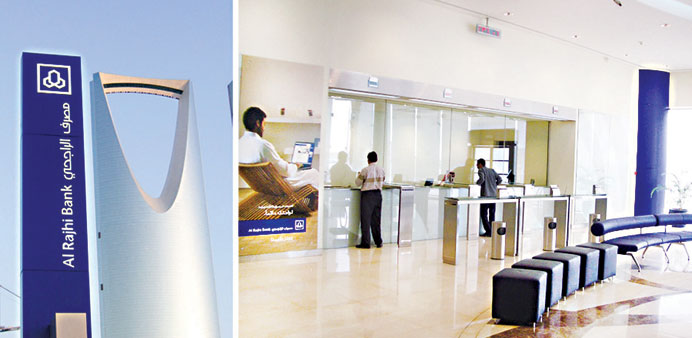Al Rajhi Bank, Saudi Arabia’s largest listed lender, posted a 2% increase in its first-quarter net profit yesterday, helped by a jump in both lending and customer deposits portfolio.
The bank made a net profit of 2.05bn riyals ($546.6mn) in the three months ending March 31, compared with 2.01bn riyals in the same period a year earlier, it said in a statement to the Saudi bourse.
Nine analysts surveyed by Reuters expected the bank to post, on average, 2.03bn riyals for the first quarter.
Two other Saudi lenders, Saudi Hollandi Bank and Saudi British Bank (SABB) beat estimates for first-quarter net profit on Monday.
Al Rajhi attributed its profit growth to higher operating income, without giving more details. Saudi banks typically do not comment on their performance until they publish more detailed results later in the quarter. Operating income for the quarter rose by 3% to 3.53bn riyals.
Total financing at the end of the first quarter stood at 180bn riyals, gaining 18.4% on the same point of 2012, although it added that its figures for financing, assets and customer deposits had been reclassified, without elaborating.
Bank lending in Saudi Arabia dipped from December’s 14-month high in the first two months of 2013 but growth was still 13.4% and 12% year-on-year in January and February respectively.
Al Rajhi’s total assets were worth 276bn riyals at the end of the first quarter, up 18% on the same point of 2012.
Samba Financial
Samba Financial Group, Saudi Arabia’s second-largest listed bank, posted a marginal rise in its first quarter net profit yesterday, but the results still beat analysts’ forecasts.
Samba said it made 1.159bn riyals ($309.1mn) in the first three months of 2013, up 1.2% over the 1.145bn riyals recorded in the same period of last year.
It attributed the slight rise in the quarterly profit to higher operating income, without elaborating.
Nine analysts surveyed by Reuters had forecast the bank to earn net profit of 1.079bn riyals in the quarter.
Saudi banks have enjoyed successive years of expansionary government budgets, ample liquidity and improving corporate loan demand.
Samba’s loans portfolio climbed 15% to 107bn riyals, while deposits grew 9% to 152bn riyals.
Total operating income for the quarter rose 6% to 1.897bn riyals, profit from special commissions grew 3% to 1.082bn riyals.
Samba’s A+ rating from Fitch was affirmed in March, with the agency stating that a resumption of loan growth, stable loan impairment charges and good cost containment should support earnings in 2013.
Dar al-Arkan
Saudi Arabia’s top real estate developer Dar al-Arkan said yesterday its first quarter net profit fell 18.8% from the same period last year to 238mn riyals ($63.5mn), although it still beat analyst forecasts.
The company blamed its year-on-year drop in profit on lower non-operating income and higher expenses in a statement it posted on the website of the Saudi bourse. Six analysts polled by Reuters had forecast, on average, that Dar al-Arkan would have first-quarter net profit of 256mn riyals.
Maaden
Saudi Arabia Mining Co, better-known as Maaden, said yesterday that first-quarter net income fell 3% to 239mn riyals ($63.7mn) as lower gold sales weighed.
Earnings per share in the three months ended March 31 amounted to 0.26 riyals, down from 0.27 riyals in the year ago period, Maaden said in a statement on the Tadawul website.
The company said a delay in the renewal of a contract with a gold refinery reduced the volume of gold sales, accounting for the drop in quarterly earnings.
Tamweel
Tamweel, a Dubai-based Islamic home financing firm, posted yesterday a 13.5% year-on-year rise in first-quarter net profit as it prepares for a full takeover by Dubai Islamic Bank. Tamweel’s quarterly net profit reached 20.5mn UAE dirhams ($5.6mn), up from 18mn dirhams in the same period last year, according to financial statements posted on the Dubai bourse website.
While income rose, Islamic financing assets fell by 244mn dirhams compared to the end of last March to 9.08bn dirhams, the statements showed.
Dubai Islamic Bank acquired a majority stake in Tamweel in 2011 as part of a post-crisis rescue. The Dubai-listed company was a prominent victim of the emirate’s sinking property market and a withdrawal of funding by banks and investors starting in late 2008. A government-orchestrated merger with rival Amlak Finance was initially contemplated but was scrapped when DIB acquired its 58.2% stake.
DIB’s shareholders last month approved a bid to take over the remainder of Tamweel. Under the terms of the offer, Tamweel shareholders are to get 10 DIB shares for every 18 Tamweel shares they hold.

